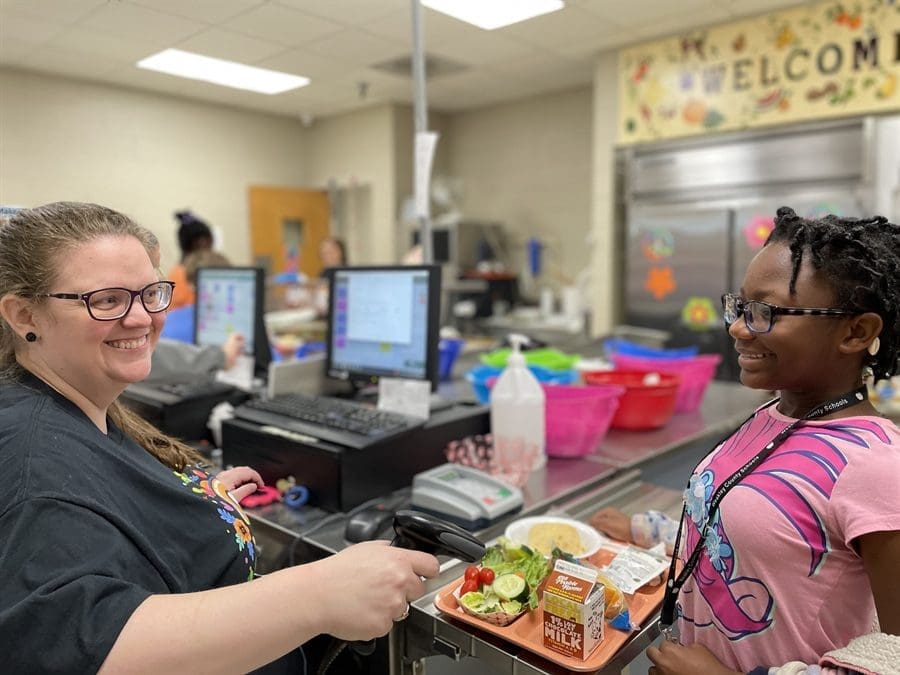In 2022, partners Communities Unlimited (CU), Eat Real, and Healthy Flavors received a Farm to School grant from the United States Department of Agriculture (USDA) to strengthen farm-to-school programs throughout the Mid-South region of Tennessee and Arkansas.
CU Healthy Foods Coordinator Brenda Williams has spearheaded the partnership. Eat Real, based in Oakland, California, is a nonprofit dedicated to transforming the food system by promoting healthy and sustainable eating habits in school districts. Healthy Flavors has farms just outside of Nashville, Tennessee, and Conway, Arkansas, and strives to provide healthy, fresh food for communities.

“Everything that school districts are doing, they’re like the heroes,” said Jiwon Jun, Senior Program Manager with Eat Real. “They’re the ones who are serving their students breakfast, lunch, dinner, and snacks every day. For a lot of students and their families, that’s where they get their most consistent meals. Farm to School is a movement that’s a big part and can be a big part of school districts to support not only those students who are eating the meals but also the local farmers, producers, ranchers, the local economy, and the community.
“When we had this opportunity to build and work on this grant with Brenda and Dan Spatz (co-founder of Healthy Flavors), we wanted to support the districts that are in these areas, that are so excited, and want to build the Farm to School movement.”
Together, the three organizations formed the Mid-South Farm To School Partnership. They are working to develop a blueprint and a collaboration map to bolster sustainable, healthy, and fresh school food programs.
“Farm to School creates opportunities to connect farmers and producers with school districts to increase access and consumption to local agricultural products. This local food movement provides an opportunity to strengthen the economy and helps support small-scale food producers.”
— Brenda Williams, Healthy Foods Coordinator, Communities Unlimited

The Farm to School project began with a screening process of rural district in low-income communities in the Delta region of Eastern Arkansas, Western Mississippi, and Western Tennessee. Williams and Spatz conducted the screening process, speaking with 96 nutrition directors about their basic awareness of the school and its principles.
The assessment involved discussions, workshops, and planning to identify those willing to go the extra mile. Williams and Spatz selected four child nutrition directors who were motivated and ready to participate, understanding the importance of building trust and sustaining efforts to improve child nutrition and community ties through farm-to-school initiatives.
The four schools chosen included Paragould School District in Northeastern Arkansas, Trenton Special School District, Milan Special School District, and Weakley County Schools in Northwest Tennessee.
“These nutrition directors showed incredible care for their kids,” Spatz said. “They demonstrated a willingness to sacrifice their own time and consider partnerships with people they didn’t even know. Their openness and willingness to engage in conversations about the next step were evident. They asked questions and displayed curiosity from the beginning, which was crucial.
"We need individuals who are open, willing to learn, and dedicated to investing their time in the belief that they can contribute to change and programmatic activities.”
— Dan Spatz, Co-Founder, Healthy Flavors Farm

THE SCHOOL DISTRICTS
PARAGOULD SCHOOL DISTRICT
Katrina Brewer is the Assistant Food Service Director at Paragould School District in Paragould, AR. Her district serves 2,500 students for lunch every day, with hopes of increasing that number over the next few years. Brewer stated that Paragould has just begun its farm-to-school initiatives.
For example, Paragould Schools have purchased fresh fruit from a local business called Scatter Creek Berries & Produce in Greene County. Brewer has bought strawberries, blackberries, pumpkins, gourds, and squash from there. Not only that, but she also purchased fresh okra locally this past summer. The kitchen staff cuts up the okra, flours it, batters it, and freezes it to make for a delicious Easter meal during the school year.
Brewer has been excited to learn about new ways to ramp up Paragould’s scratch cooking program with farm-to-school initiatives.
“It’s a great opportunity,” Brewer said. “We hope to continue to increase our lunch count. The more things that we can do, the more items that we can try to bring in that the kids may eat, that is what I want. I want to get them fed before they go home for the day.”
TRENTON SPECIAL SCHOOL DISTRICT
Lisa Seiber-Garland works as the School Nutrition Director at Trenton Special School District located in Trenton, TN. The school serves over 1,400 students with breakfast and lunch daily. Seiber-Garland shared that the Farm to School grant has enabled her school to invest in raising chickens.
“With the Farm to School grant, we bought chicken coops, chicken compost, we’re raising chickens,” Seiber-Garland said. “They’re laying eggs. We’re using those in the schools, and when we have an excess, we’re donating them to the community kitchen and to the jail.”
Trenton Schools has installed five hydroponic towers to grow their own lettuce, and part of the grant money also supports an after-school program with a culinary class, providing them with portable kitchen equipment. Other parts of the funds go to a high school special needs classroom, where students learn life skills through harvesting and preparing food.
In addition, local produce from vendors like Blackberry Pond and Bale Farms, as well as fresh beef from Stockyard Market, are utilized in school meals to support local farmers.
“We have been able to offer students fresh and local foods that are amazing, that so many of their parents can’t afford, and so at least they can get it through us,” Seiber-Garland said. “I’m very glad to help our local farmers because that’s feeding into our future as well.”
MILAN SPECIAL SCHOOL DISTRICT
In Milan, TN Vickie Dunaway serves as the School Nutrition Director at Milan Special School District, a school proud to provide fresh local food for its 2,000 students on a regular basis.
“We’ve been trying to come back to the basics and get kids more into learning to grow food, to appreciate where the food’s coming from,” Dunaway said. “Appreciating just growing it themselves. And understanding, it’s healthier. Tastier. It’s giving back to our environment. It’s giving back to our community.”
Since Milan Schools is located just 15 minutes from Trenton, Dunaway buys fresh beef from the same stockyard market as Seiber-Garland. She has been purchasing local greens such as cucumbers, tomatoes, bell peppers, and more at the farmer’s market to support community growers. Dunaway also purchases fresh fruit locally such as strawberries, blackberries, and blueberries from farms whenever they’re in season.
Dunaway underscores the importance of providing local healthy food for children.
“It’s the ground roots,” Dunaway said. “We know it’s local. The health’s here. It starts here. It stays here. The money stays in the community.”
WEAKLEY COUNTY SCHOOLS
Brenda Scott serves as the School Nutrition Administrative Assistant at Weakley County Schools in Dresden, TN. The School Nutrition Department provides meals for nearly 3,000 students a day and that’s just for lunch.
Weakley County Schools have been participating in Farm to School for several years now and are excited to continue improving meal quality through this partnership. Scott explained the various types of local foods the district has already purchased.
“We get sweet potatoes from a local company in Gleason (Tennessee),” Scott said. “We get strawberries and watermelons from Bell Farms in Gleason. We get lettuce from our own school farms. We also purchased pigs from our high school farm and had Yoder Brothers Meat Processing make sausage for us. They are closed now but did that for us. We have done a lot through Farm to School.”
Scott highlighted several benefits of the farm-to-school initiatives.
“It’s given us extra funding to purchase locally grown products, which has helped,” Scott said. “I believe our local farmers give us a better deal than other food sources on cost. The grant has helped a lot with the food cost part of it.”

CREATING SUSTAINABILITY
In their collaboration with Farm to School, Williams, Spatz, and Jun have drawn inspiration in the dedication of the four food service directors. They regard them as heroes and leaders committed to their students’ well-being.
Looking ahead, the next step involves establishing sustainability, ensuring that Farm to School initiatives endure for generations to come.
“I feel honored that we’re supporting these heroes and their goals of providing the best food for their students,” Jun said. “This includes Farm to School and local purchasing. I know they’re also proud when they can support their local community, farmers, and producers.”
"It truly takes a village; no one can do it alone. This is a prime example of that. Creating something sustainable requires the efforts of many, and while it may be challenging, the outcomes are beautiful.”
— Jiwon Jun, Senior Program Manager, Eat Real


